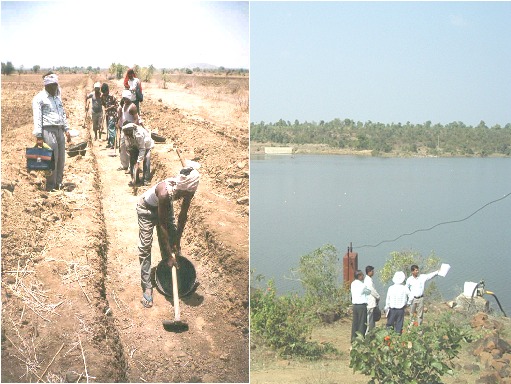Author : Ulhas Krishna Apte

Left - Excavation of the main canal at Pimpri-Hatgaon MIT in 2003 by the farmers, under the supervision of the field officers; Right - Completed installation of a LIS in Kasari ST by the farmers
These schemes were to be completed by following a Participatory Irrigation Development & Management (PIDM) approach. Under this approach, farmers were involved from the beginning. They are also to contribute for Water Distribution System. This is perhaps the first experiment of this kind, in Maharashtra.
MIP-M was designed in two phases; a pilot phase and main phase with extended phase called 'consolidation phase' finally ending on 30th June 2011.
The 28 schemes stand included in MIP-M, consist of 16 MI Tanks(MITs), 9 Storage Tanks(STs) and 3 Kolhapur Type Weir (KTWs- weir-cum-bridge). All head-works of Schemes have been completed, with Water Users Associations(WUAs) assuming responsibility for Operation and Maintenance(O&M) on 9 schemes with completed irrigation systems. The balance works on the distribution systems and hand-over to WUAs are scheduled for completion before June 2012.
Vision & achievement :
Although the purpose of MIP-M was to increase irrigated agriculture and farmer incomes through the construction of MIS, more importantly was the need to demonstrate that by following a Participatory Irrigation Development and Management (PIDM) approach, water utilisation is maximised and the ongoing O&M burden on Govt for these schemes is greatly reduced. Following are the major achievements on the programme :
- Head-work construction of 27 schemes is completed
- Distribution systems completed in 10 schemes and work is in progress in balance schemes
- Efficiency on functional MISs was very high (more than 75%)
- WUAs are registered in all 28 schemes
- 10 schemes are handed over to WUA
- Training in PIDM has been imparted to all MI(LS) and NGO staff as well as participating Taluka Agricultural Officers in the MIP-M schemes
- PADP Programme implemented in 25 schemes.
- Potential irrigated area increased 4,500 hectares.
- Increase in net benefits of 26,000/ha
- Cropping intensity & Crop yields have increased
- Besides, Water Charges, WUAs also collect funds through fisheries
- Improved living standard in programme/project areas
As far as farmers are concerned, the most significant major impact of MIP-M, is the important increase in income and employment even beyond rainy season. The major outcomes/effects of irrigation observed at the MIP-M schemes are listed below:
- Higher income, greater food security, better diet from more diverse crop,
- Diverting surplus income to generate more income, improved farm equipments,
- Credit availability, life insurance, access to education,
- Access to medical care, improved public health, improved personal hygiene,
- More farmers now practice birth control,
- Use of more sustainable and less polluting cooking fuel,
- Support to fishermen and more fish in diet,
- Finding highest paying market and establishing marketing linkages, Farmers become proactive in forming institutional linkage,
- Increase in land value,
- Increased demand for labour, decrease in rural to urban migration, minimizing suicide cases,
- Better control on floods, increase in water table in 3 MISs out of 4 reviewed
Main lessons learned and strongly recommended for adoption on similar programme/projects in the future
The main lessons learned and strongly recommended for adoption on similar programme/projects in the future, are
- MIP-M has shown it is possible to develop MI schemes with the farmers and build the capacity of WUAs to operate and maintain the infrastructure in an efficient and sustainable way by following a PIDM approach.
- A 3-4-year implementation time-frame is required for new scheme development (till completion of PADP), for others schemes with headworks already completed. It can be less.
- More than one agency is required in the development of a MIS , which should be divided in two parts. The MI(LS)/Govt. department should be responsible for the head-works and an appropriate Non-Govt Organisations (NGOs) / private agency appointed for all aspects of the distribution system including WUA and agricultural development.
- Only competent contractors should be appointed to the works and proper quality control and contract supervision provided by the govt supervisors.
/articles/success-first-participatory-irrigation-development-management-programme-and-its-further